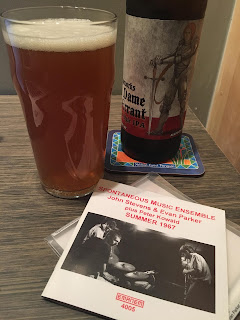 Jay Clayton
Jay Clayton &
Jerry Granelli Sound Songs (
Winter & Winter)
This album has been on the "to get" list for a little while after being highly recommended by my friend
Cheryl. Vocal and Drum/Percussion duets are fairly rare and that alone makes it worth checking out. But I won't stop there - the music is superb.
The majority of the album is made up of what I safely assume are free improvisations. There is an improvised(?) setting of Emily Dickenson's "I'm Nobody" and the duo's take on "Goodbye Porkpie Hat" is one of the best I can recall hearing.
Initially, I was struck by the use space and dynamics from both players and this remained on repeated listens. There is an unhurried feel to the album and the dialogue between the two throughout the album is top shelf. They keep things interesting with changes in timbre, textures, feeling etc. Fascinating listening and one of the best vocal albums I've heard for a while.
This is a straight reissue of the material found on the LP release by JMT Productions from 1985 and the 43 minute length sits well with me. It's a nice length for focussed listening. A highly recommended album that I'm already adding to my 2015 Round-Up.
Spontaneous Music Ensemble Oliv & Familie (
Emanem)
Reissued last year, this release features a couple of sessions from 1968 and 1969. Three of the four pieces are by 9 & 11 piece groups and one by a quartet. There are plenty of familiar names - John Stevens (d) Evan Parker (ss) Norma Winstone (v) Trevor Watts (as/piccolo) Dave Holland (b) Derek Bailey (g) and Kenny Wheeler (flugel horn). I was pleasantly surprised to see New Zealander
Brian Smith on flute - I had no idea he was involved with this group of players (from SME to
Moonlight Sax..... quite a leap).
I've gave this disc a few spins before jotting down some notes during one of the listens. Here they are.... slightly edited so they make some kind of sense.
"Familie" Opens up with a droning pedal tone (which underpins most of the piece). I enjoy the blend and there is a haunting, floating quality with the piano, guitar and drums gradually becoming more prominent. The sustained notes remain as players interject with runs, stabs and flurries of notes. There is no "soloist" as such - it's a collective effort and a unified one at that. By the middle of the piece the sustained notes have all but disappeared, the improvising is more line orientated with the bass and drums up tempo - the overall feel is busier/denser. Things settle down for the final few minutes and the sustained notes return.
The second version is 8mins shorter (sounds like there could be a fade-in at the start). Things seem to move faster with the density rising quicker and remains for the majority of the track before the droning sound returns to takes things out.
"Oliv" first take features a 9 piece ensemble
Kicks off with vocals, percussion and saxophone. Wheeler has a soloist roll with drone from the three vocalists and Watts with accompaniment from Bailey. Eventually the bass kicks in and is joined by piano and drums with the time feel broken up (before settling into a mid tempo swing). Wheeler blows before the piano takes over and the drone continues beneath. Three quarters of the way through things are quite dense and energy levels high with Wheeler, Bailey and Peter Lever collectively improvising before things drop up down as the end fairly sparsely.
The second take is stripped back to the quartet of Maggie Nichols (v) Trevor Watts (as) Johnny Dyani (b) and John Stevens (d). As you would expect the sound is less dense and I find there is more clarity for the listener - Watts and Nichols work around the drone - shaping, breaking and rejoining it while Dyani plays rich pizzicato lines and Stevens' toms keep the piece driving. Again there is not really a soloist and accompaniment - the quartet collectively improvises (by the middle of the piece the drone has been left behind altogether) and the playing in general is busier. The drone comes back in around the11 minute mark and now this is a more soloistic approach from the bass. The ending is a treat (I won't spoil it for you).
A few things stood out to me on this disc - the composed structures, the presence of the vocalists and hearing Parker and Bailey very much in the background on both takes of "Familie." Another enjoyable disc that is well worth giving a listen or three. I'm looking forward to checking out more early recordings from SME.


